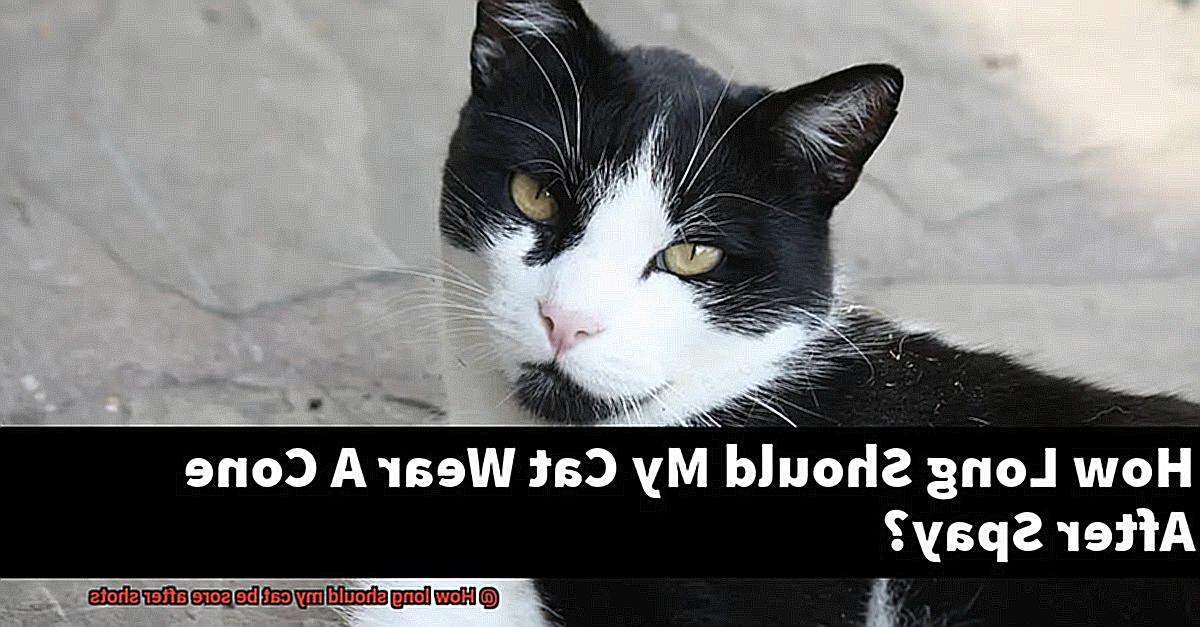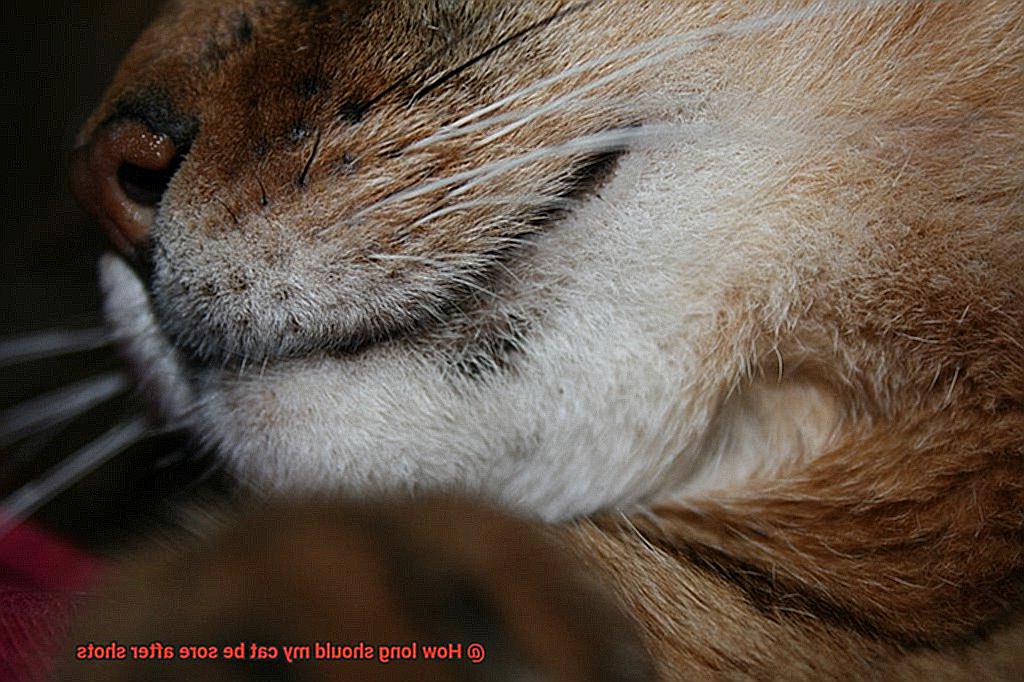As a devoted cat lover, your kitty’s health and happiness are of utmost importance. Keeping up with their vaccinations is crucial in ensuring their well-being. However, some pet owners have reported that their feline friends experience soreness after receiving shots.
If you’ve noticed your cat acting more sluggish than usual or displaying signs of discomfort after vaccinations, you may be wondering how long this soreness will last. As a responsible pet owner, it’s natural to want to know how long you need to keep an eye on your furry friend and ensure they’re healing properly.
In this blog post, we’ll delve into the duration of soreness and discomfort your cat may experience after vaccination shots. We’ll also share tips on how to make your feline companion as comfortable as possible during their recovery period. Additionally, we’ll explore the reasons behind why cats may feel sore after vaccines and offer suggestions on how to alleviate their discomfort. So sit tight, get ready to learn, and let’s jump right in.
What Causes Soreness After Vaccinations?
Vaccinations are a crucial aspect of feline healthcare, but they can sometimes cause soreness at the injection site. So, what causes this discomfort?

Vaccines work by stimulating the immune system to produce an immune response. This response can cause inflammation at the injection site, leading to pain and tenderness. The size of the needle and vaccine components may also irritate surrounding tissues, exacerbating discomfort.

Certain vaccines may provoke more inflammation than others, and receiving multiple injections in one visit can increase soreness that lasts longer. Additionally, some cats may be more sensitive to vaccines than others, causing soreness for extended periods.

While soreness is a common side effect of vaccinations, it’s essential to note that extreme soreness or swelling could signal an adverse reaction to the vaccine. If your pet experiences these symptoms, get in touch with a veterinarian without delay.
As a cat owner, there are ways to alleviate your pet’s soreness. Providing a comfortable environment and monitoring them for signs of discomfort or adverse reactions can go a long way. Applying a cold compress or providing pain medication under veterinary guidance can also help your furry companion feel better.
Factors That Affect the Duration of Soreness
Vaccinations are an integral part of achieving this goal, but they can also cause some discomfort. If you’re wondering how long your cat will be sore after receiving shots, several factors can affect the duration of soreness.
The type of vaccination administered to your cat plays a significant role in determining how long they will experience soreness. Vaccines that contain adjuvants, substances that enhance the immune response to the vaccine, are known to cause more discomfort than those without adjuvants. Moreover, the site of injection is another crucial factor that can impact soreness duration. Injections given into muscles or near joints may cause more pain and soreness than those given under the skin.
Your cat’s age and overall health can also affect how long they will be sore after shots. Kittens and older cats may experience soreness for an extended period due to their weaker immune systems or pre-existing health conditions. Additionally, the number of vaccines administered during one visit can lead to more inflammation and discomfort at the injection site.
It’s important to remember that some degree of soreness after vaccination is normal and expected for most cats. However, if your cat seems excessively uncomfortable or shows signs of an adverse reaction, it’s crucial to contact your veterinarian immediately.
Types of Vaccines and Their Impact on Soreness

Vaccines can cause some discomfort and soreness at the injection site. Here are five sub-sections that explain the impact of different types of vaccines on cats’ soreness at the injection site:
Modified Live Vaccines (MLVs)
MLVs contain a weakened form of the virus and can provide faster immunity and longer-lasting protection. However, they can also cause more side effects such as soreness at the injection site. This type of vaccine stimulates a stronger immune response, leading to more inflammation at the injection site, resulting in soreness.

Killed Vaccines
On the other hand, killed vaccines contain inactivated viruses and are generally safer with fewer side effects. They may not provide immunity as quickly as MLVs, but they may have fewer side effects, including less soreness at the injection site. This vaccine type induces less inflammation at the injection site, resulting in less soreness.
Core Vaccines
Core vaccines protect against common diseases such as rabies, feline distemper, and feline calicivirus. These vaccines are usually administered via an injection into the muscle and can cause some soreness at the injection site. The soreness is often mild and resolves within a few days.

Non-Core Vaccines
Non-core vaccines protect against less common diseases such as feline leukemia virus and feline immunodeficiency virus. Like core vaccines, these are also usually injected into the muscle and can cause soreness at the injection site. However, the intensity of soreness may vary depending on factors such as vaccine type and individual cat’s immune response.
Intranasal Vaccines
Unlike injectable vaccines, intranasal vaccines are administered through the nose and can protect against respiratory infections like feline herpesvirus. Although they may not cause soreness at the injection site, they may still cause some irritation in the nasal cavity. This can cause sneezing or discharge for a few days.
Number of Vaccines Given at Once
One crucial step in achieving this goal is through vaccinations. However, it’s essential to consider the number of vaccines given at once.
While there are varying opinions on the ideal number of vaccines to give at once, it’s generally recommended to limit the number to two or three. This approach helps minimize adverse reactions and enables easier identification of any potential issues that may arise.
Your veterinarian can provide necessary guidance when deciding on the ideal number of vaccines to give at once. Depending on your cat’s unique needs and medical history, they may recommend administering multiple vaccines in one visit or spreading them out over several visits.
It’s worth noting that certain vaccinations may be more likely to cause soreness than others. For instance, the rabies vaccine is renowned for causing soreness and swelling at the injection site, while the feline leukemia vaccine may not.
Although some soreness is expected post-vaccination, it is typically short-lived, lasting a few days. However, if the soreness persists or becomes severe, don’t hesitate to contact your veterinarian for further guidance.
Remember that vaccinations are a fundamental part of keeping your cat healthy and safe from dangerous diseases. By working closely with your veterinarian and adhering to their recommended vaccination schedule, you can help ensure that your feline friend remains happy and healthy for years to come.
In summary, here are some key points to keep in mind:
Individual Tolerance to Pain
You may have noticed that your cat seems to be more uncomfortable after some shots compared to others. This is because, just like humans, cats have different pain thresholds, which means that some may experience more pain and discomfort than others.
When it comes to individual tolerance to pain in cats, there are various factors to consider. Let’s explore them:

- Age: Younger cats and kittens tend to have a lower pain threshold than adult cats. This means that they may experience more discomfort after receiving shots. Therefore, it’s essential to monitor their behavior and provide extra care during this time.
- Breed: Certain cat breeds may be more sensitive to pain than others. For instance, the Siamese breed is known to be more vocal and expressive when it comes to pain. Hence, it’s crucial to factor in your cat’s breed when assessing their level of discomfort.
- Overall health: If your cat has an underlying health condition, they may experience more pain and discomfort after receiving shots. Therefore, it’s important to consult with your vet before administering any vaccinations.
- Specific vaccine given: The type of vaccine administered can also affect your cat’s level of discomfort. Some vaccines may cause more inflammation at the injection site, leading to increased pain and discomfort.

While some soreness and discomfort are normal after receiving shots, excessive pain and swelling can indicate an adverse reaction. In such cases, you should seek immediate medical attention from your veterinarian.
Common Symptoms of Prolonged Soreness
Vaccinations are an important part of their healthcare routine, but sometimes they can cause soreness at the injection site. While this is a normal reaction and should only last a few days, prolonged soreness can be a cause for concern.
Here are some common symptoms of prolonged soreness in cats after receiving a vaccine:
Swelling:
One of the most noticeable symptoms of prolonged soreness is swelling at the injection site. The area may also feel warm and appear red, indicating an inflammatory response. If your cat’s swelling persists for more than a few days or if it gets worse, it may be a sign of an infection or allergic reaction.
Lethargy:
Another symptom of prolonged soreness is lethargy or lack of energy. Your cat may seem more tired than usual and may not be as active or playful as they normally are. This could be a sign that their body is fighting off potential infections or reactions to the vaccine.
Fever:
In some cases, cats may develop a fever as a result of prolonged soreness. A fever is the body’s natural response to an infection or inflammation and can indicate that the immune system is working hard to fight off any potential threats.
It’s crucial to monitor your cat closely after they receive a vaccine and contact your veterinarian immediately if you notice any of these symptoms. While soreness and mild reactions are common after vaccinations, prolonged symptoms may indicate a more serious issue that requires medical attention.
How to Treat Soreness at the Injection Site
However, soreness at the injection site is a common side effect that can cause discomfort for your pet. In this blog post, we will explore five effective ways to treat soreness at the injection site in cats.
Cold Compress
Applying a cold compress is the first step in treating soreness at the injection site. This can help to reduce inflammation and swelling, which can contribute to discomfort. You can use a bag of frozen peas or a cold pack wrapped in a towel for this purpose. Apply the compress for 10-15 minutes at a time, several times a day.
Massage the Area
Gently massaging the area around the injection site can help to increase blood flow and reduce inflammation, which can alleviate soreness. Use gentle circular motions with your fingers, being careful not to press too hard or cause any additional discomfort to your cat.
Pain Medication
In some cases, your veterinarian may prescribe pain medication to help manage your cat’s soreness. It is important to follow your vet’s instructions closely when administering any medication and never give your cat any human medications without consulting with your vet first.
Monitor Your Cat’s Symptoms
It is essential to monitor your cat closely for any signs of infection or other complications following their injections. If you notice any redness, swelling, discharge, or other unusual symptoms at the injection site, contact your vet immediately for further guidance.
Warm Compress
Applying a warm compress to the affected area is another effective way to alleviate soreness. A warm towel or heating pad can be used for this purpose. Be sure to apply the compress gently and avoid putting too much pressure on the injection site.
When to Seek Veterinary Care for Prolonged Soreness
Vaccinations are a crucial part of keeping your cat protected from various diseases, but it’s essential to monitor them after receiving vaccinations for any signs of soreness or discomfort.
If your cat experiences prolonged soreness after vaccination, it could be a sign of a severe allergic reaction or infection. While some soreness is normal, if it persists beyond a couple of days, seeking veterinary care is vital. Delaying treatment could be life-threatening for your cat.
Apart from prolonged soreness, look out for other symptoms like lethargy, loss of appetite, vomiting, diarrhea, and trouble breathing. If your cat exhibits any of these symptoms, don’t hesitate to seek veterinary care immediately.
It’s worth noting that every cat’s reaction to vaccines is different. Some may experience mild reactions while others may suffer severe allergic reactions. Err on the side of caution and seek veterinary care when in doubt.
When you take your cat to the vet, they’ll perform a thorough examination to determine the underlying cause of the prolonged soreness. They may prescribe pain medication or antibiotics to alleviate the discomfort and treat any underlying infections.
aDHh1meTv6M” >
Conclusion
In conclusion, vaccinations are a crucial aspect of feline healthcare, but they can sometimes cause soreness at the injection site. While a certain level of soreness is to be expected and should only last for a few days, prolonged discomfort can be concerning. The duration of soreness after shots can depend on various factors such as the type of vaccine administered, the number of vaccines given at once, and your cat’s individual pain tolerance.
It is essential to keep a close eye on your cat after vaccination and immediately contact your veterinarian if you notice any signs of prolonged soreness or adverse reactions. Creating a comfortable environment and monitoring them for signs of discomfort or adverse reactions can significantly aid in their recovery. Under veterinary guidance, applying a cold compress or providing pain medication can also help alleviate their discomfort.
It’s important to remember that every cat responds differently to vaccines, with some experiencing mild reactions while others may suffer severe allergic reactions.

